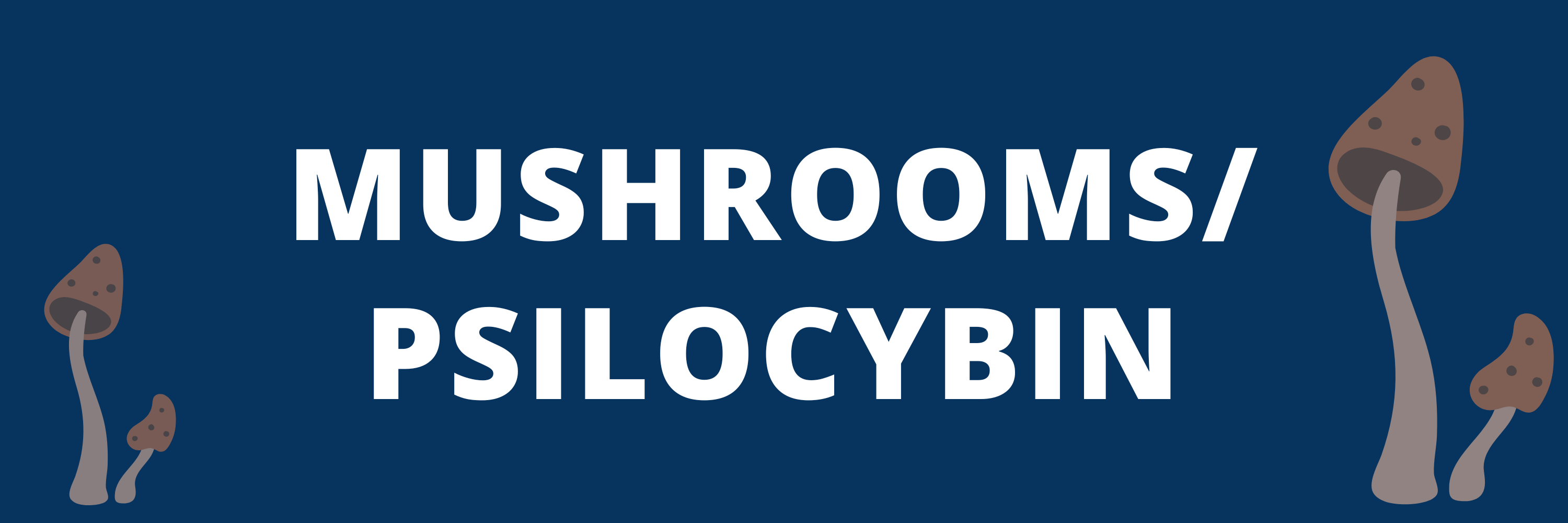Note: UC Davis neither condemns nor condones the use of Shrooms/Psilocybin. We are here to provide unbiased educational resources based on scientific research.
What is Psilocybin (Shrooms)?
Psilocybin is a hallucinogen chemical that is found in certain mushrooms. These mushrooms are often called Shrooms or Magic Mushrooms. These mushrooms are ingested orally, brewed in tea, or added to other foods to mask their bitter flavor. Psilocybin is classified under Schedule I under the Controlled Substances Act.
History
There is a long history of psilocybin use among humans and indigenous cultures, especially for religious purposes. Some estimate that psilocybin has been consumed as far back as 9000 BCE in North Africa and Spain, where ancient stone paintings of mushrooms were found. The Aztec and Mayan societies consumed mushrooms in religious ceremonies and called them “Flesh of the Gods.”
Effects
Psilocybin activates serotonin receptors, which is known as the “feel good” hormone that regulates mood, happiness, digestion, and metabolism. Psilocybin mainly affects the brain’s prefrontal cortex which plays a key role in abstract thinking, mood, and perception.
The “trip” starts around 20-90 minutes after being ingested and can last anywhere from 15 minutes to 12 hours. The effects depend on the individual, but some common effects are:
- Hallucinations
- Sensory distortion
- Synesthesia
- Seeing sounds
- Hearing colors
- Mood changes
- Euphoria
- Derealization (feeling like surroundings are not real)
- Depersonalization (disengaged from surroundings)
- Dilated pupils
- Distorted sense of time (slowed down)
Some potentially negative effects include:
- Anxiety
- Muscle weakness
- Lack of coordination
- Nausea and vomiting
- Paranoia/Fear
- Confusion
- Frightening hallucinations
Safety
Abstaining from use is always the safest option. However, if you do decide to use psilocybin, consider some of these tips:
- Make sure that you are taking the right mushroom. They can be easily confused with a poisonous mushroom.
- The environment is important to consider when using psilocybin. Chances of having a “bad trip” are reduced when one takes the drug with trusted individuals in an environment they feel safe in and is not too overstimulating.
- An individual’s state of mind before consuming Psilocybin is also important. Feeling stressed or anxious before taking the drug can increase the risk of a “bad trip.”
- Start with small doses
What happens after?
Psilocybin is not chemically addictive. However, individuals might have psychological withdrawal in the days after ingesting and may have some difficulty adjusting back to reality.
Use of Psilocybin in clinical studies
Studies have indicated that psilocybin may be successful to treat and reduce clinical depression when combined with psychological support/ talk therapy. These findings mainly come from John Hopkins University. While these studies are promising, there is difficulty conducting scientific research for psilocybin since it is a classified Schedule I drug.
Resources
- General information about psilocybin
- Drug Fact Sheet from the DEA
- Studies on psilocybin from John Hopkins University
- SHCS webpage on psilocybin
- Clinical Trials

